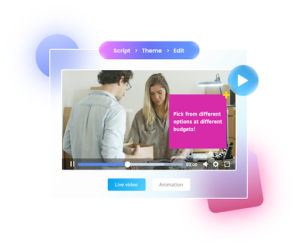Contents
Introduction:
Artificial Intelligence (AI) has permeated nearly every aspect of our lives, from personalised recommendations on streaming platforms to voice assistants that help us navigate our daily tasks. However, one area where AI is truly revolutionising the way we interact with media is in video production. In this blog post, we’ll dive into the world of AI-powered video creation and explore the myriad ways in which artificial intelligence is making videos special.
The Rise of AI in Video Production
Over the past decade, advancements in AI technology have enabled remarkable progress in video production. AI-powered tools and algorithms are now capable of automating various aspects of the video creation process, from content generation to editing and post-production. This has democratised video production, making it more accessible to individuals and organisations with varying levels of expertise and resources.

Content Generation and Storytelling
One of the most exciting applications of AI in video production is in content generation and storytelling. AI algorithms can analyse vast amounts of data, including text, images, and videos, to generate coherent narratives and storylines. This capability is particularly useful for creating engaging video content for marketing campaigns, educational purposes, and entertainment. The AI video creator tool makes things easy. It writes the script, adds videos, subtitles, music, and transitions. Then, use the easy editor to make final touches. Make lots of videos without learning difficult stuff!
For example, AI-powered tools can analyse a brand’s marketing objectives and target audience demographics to generate personalised video ads that resonate with viewers. Similarly, in the entertainment industry, AI algorithms can analyse script data and audience preferences to generate plot outlines and character arcs for films and TV shows.
Video creation and Post-Production
AI is transforming the video creation and post-production process, enabling creators to produce professional-quality videos with minimal manual intervention. AI-powered tools leverage machine learning algorithms to analyse footage, identify key moments, and automatically assemble them into a cohesive narrative.
Additionally, AI algorithms can enhance video quality by removing imperfections such as camera shake, background noise, and lighting issues. This results in polished, high-quality videos that captivate viewers and enhance the overall viewing experience.
Personalization and Audience Engagement
Another area where AI is making videos special is in personalization and audience engagement. AI algorithms can analyse viewer data, including viewing habits, preferences, and demographics, to deliver personalised video recommendations and experiences.
For example, streaming platforms use AI-powered recommendation engines to suggest content tailored to each viewer’s interests and viewing history. Similarly, interactive video experiences powered by AI enable viewers to engage with content in real-time, making the viewing experience more immersive and interactive.
Creative Expression and Innovation
AI is also pushing the boundaries of creative expression and innovation in video production. AI-powered tools and platforms enable creators to experiment with new storytelling techniques, visual effects, and artistic styles that were previously unattainable.
Ethical Considerations and Challenges
While AI offers tremendous potential in video production, it also raises ethical considerations and challenges that must be addressed. Additionally, the use of AI in video production raises questions about job displacement and the future of creative industries. As AI-powered tools become more advanced and accessible, there is a risk that traditional roles in video production, such as editors and visual effects artists, could be automated, leading to job losses and economic uncertainty.
Conclusion
In conclusion, artificial intelligence is transforming the way we create, consume, and interact with video content. From content generation and storytelling to video editing and audience engagement, AI-powered tools and algorithms are making videos special in ways we never thought possible. While the rise of AI in video production presents exciting opportunities for innovation and creativity, it also poses ethical considerations and challenges that must be addressed. As we continue to explore the potential of AI in video production, it’s essential to approach its development and deployment with careful consideration for its impact on society, culture, and the future of work. By embracing the possibilities of AI-powered video production while remaining mindful of its implications, we can harness the full potential of artificial intelligence to create compelling, impactful videos that inspire, educate, and entertain audiences around the world.

